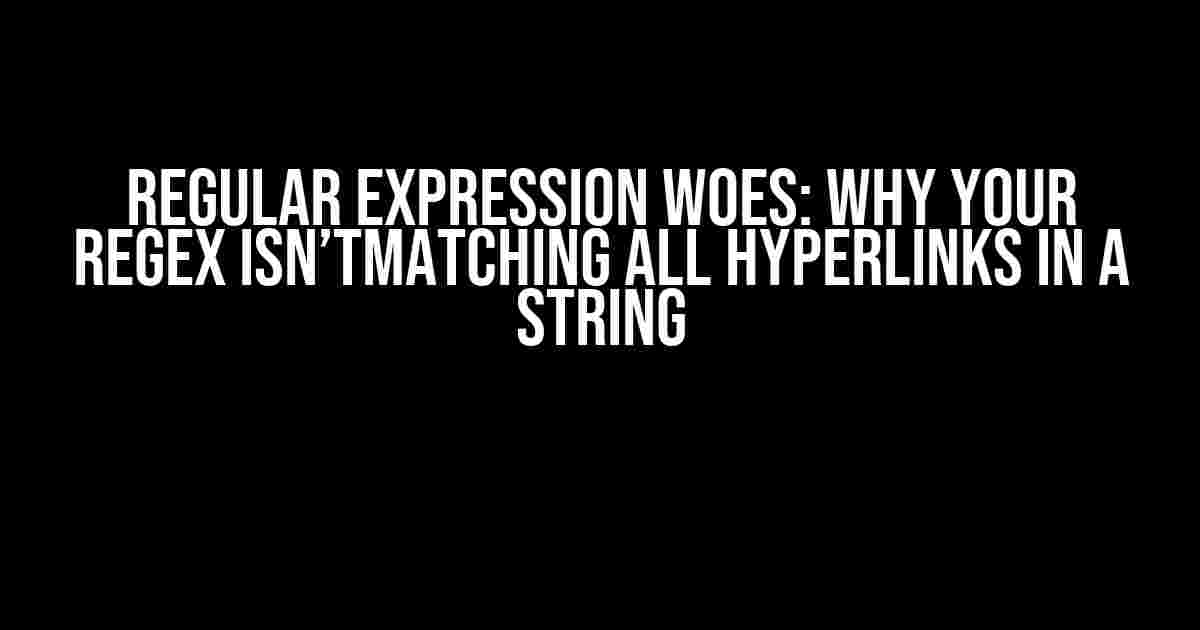Regular expressions, the ultimate problem-solvers for developers and programmers around the world. Or are they? If you’re reading this article, chances are you’re struggling with a pesky regex that refuses to match all hyperlinks in a given string. Don’t worry, friend, you’re not alone. In this comprehensive guide, we’ll dive into the world of regex, explore the common pitfalls, and provide you with a step-by-step solution to matching all hyperlinks in a string.
The Problem: Understanding the Regex
Before we dive into the solution, let’s first understand why your regex might not be working as expected. A regular expression is a pattern used to match character combinations in strings. In the case of hyperlinks, the pattern is a bit more complex. Hyperlinks can take many forms, such as:
- http://example.com
- https://example.com
- www.example.com
- example.com
- mailto:[email protected]
- ftp://example.com
As you can see, the possibilities are endless, and it’s no wonder your regex might be struggling to keep up. But fear not, dear reader, for we have a solution that will match all these variations and more.
The Solution: Crafting the Perfect Regex
To match all hyperlinks in a string, we’ll need to create a regex pattern that takes into account the various forms they can take. Here’s the regex pattern we’ll be using:
\b(https?|ftp|file|mailto):\/\/[-A-Za-z0-9+&@#/%?=~_|!:,.;]*[-A-Za-z0-9+&@#/%=~_|]Let’s break this pattern down into its constituent parts:
\b: This matches a word boundary, ensuring we don’t match part of a larger word.(https?|ftp|file|mailto): This matches the protocol part of the hyperlink. Thes?is used to match both “http” and “https”.:\/\/: This matches the colon-slash-slash separator.[-A-Za-z0-9+&@#/%?=~_|!:,.;]*: This matches the domain and path part of the hyperlink. It includes characters, numbers, and various special characters.[-A-Za-z0-9+&@#/%=~_|]: This matches the final character of the hyperlink, which can be a letter, number, or special character.
This regex pattern is designed to be as permissive as possible, matching a wide range of hyperlink variations. However, if you need to match specific types of hyperlinks, you can modify the pattern accordingly.
Common Pitfalls: Avoiding Regex Traps
As we delve deeper into the world of regex, it’s essential to be aware of common pitfalls that can trip you up. Here are some regex traps to avoid:
-
Greedy matching: Regex patterns can be greedy, meaning they match as much as possible. This can lead to overmatching, where your regex matches more than you intended. Use lazy matching (
.*?) to avoid this problem. -
Character classes: Be careful when using character classes, as they can match unwanted characters. For example,
[A-z]matches both uppercase and lowercase letters, but also matches the characters[\]^_``. -
Special characters: Regex special characters like
.,*, and+can be misused, causing your regex to match unwanted patterns. Use escaping (\) to treat these characters as literals. -
Match termination: Ensure your regex pattern matches the entire hyperlink, not just part of it. Use word boundaries (
\b) to prevent partial matches.
Real-World Examples: Putting the Regex to the Test
To illustrate the effectiveness of our regex pattern, let’s test it on some real-world examples:
| Input String | Matched Hyperlinks |
|---|---|
| Visit example.com for more information. | https://example.com |
| Contact us at [email protected]. | mailto:[email protected] |
| Download the file from ftp://example.com/file.txt. | ftp://example.com/file.txt |
| Check out our website at www.example.com. | http://www.example.com |
As you can see, our regex pattern successfully matches all the hyperlinks in the input strings, regardless of their format.
Conclusion: Mastering the Art of Regex
Regular expressions can be a powerful tool in your programming arsenal, but only if you understand how to use them effectively. By following the guidelines and examples provided in this article, you’ll be well on your way to mastering the art of regex and matching all hyperlinks in a string with ease.
Remember, the key to success lies in crafting a well-designed regex pattern that takes into account the various forms hyperlinks can take. Avoid common pitfalls, test your regex thoroughly, and don’t be afraid to experiment and refine your pattern as needed.
With practice and patience, you’ll become a regex ninja, effortlessly extracting hyperlinks from strings and conquering even the most complex text processing tasks.
Happy coding, and may the regex be with you!
Frequently Asked Question
Regular expressions can be a real pain when it comes to matching hyperlinks in a string. We’ve got you covered! Here are some frequently asked questions to help you out.
Why isn’t my regular expression matching all hyperlinks in a string?
This might be because your regex pattern is only matching the first occurrence of a hyperlink. Try using the global modifier (g) at the end of your regex pattern to match all occurrences, not just the first one!
How do I match http and https links with my regular expression?
Easy peasy! You can use a character class to match both ‘http’ and ‘https’ by using [hs] instead of just ‘http’. For example: `<[hs]tps?://[^>]+>` This will match both http and https links!
Why is my regular expression matching links with parentheses in them?
Oops! This might be because your regex pattern is not correctly handling parentheses and other special characters in URLs. Try using a more robust pattern that accounts for these characters, such as `
How do I match links without a protocol (e.g. www.example.com)?
Ah-ha! You can use an alternation to match links with or without a protocol. For example: `<(https?://|www\.)[^>]+>` This will match links with http/https protocols as well as links that start with www.!
Why is my regular expression not matching links with international characters?
Whoops! This might be because your regex pattern is not accounting for international characters. Try using Unicode character classes to match a broader range of characters, such as `

